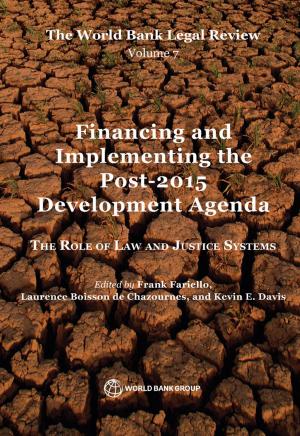Making Politics Work for Development
Harnessing Transparency and Citizen Engagement
Business & Finance, Economics, Microeconomics, Economic Development, Development & Growth| Author: | World Bank | ISBN: | 9781464807749 |
| Publisher: | World Bank Publications | Publication: | July 14, 2016 |
| Imprint: | World Bank Publications | Language: | English |
| Author: | World Bank |
| ISBN: | 9781464807749 |
| Publisher: | World Bank Publications |
| Publication: | July 14, 2016 |
| Imprint: | World Bank Publications |
| Language: | English |
Governments fail to provide the public goods needed for development when its leaders knowingly and deliberately ignore sound technical advice or are unable to follow it, despite the best of intentions, because of political constraints. This report focuses on two forces—citizen engagement and transparency—that hold the key to solving government failures by shaping how political markets function. Citizens are not only queueing at voting booths, but are also taking to the streets and using diverse media to pressure, sanction and select the leaders who wield power within government, including by entering as contenders for leadership. This political engagement can function in highly nuanced ways within the same formal institutional context and across the political spectrum, from autocracies to democracies. Unhealthy political engagement, when leaders are selected and sanctioned on the basis of their provision of private benefits rather than public goods, gives rise to government failures. The solutions to these failures lie in fostering healthy political engagement within any institutional context, and not in circumventing or suppressing it. Transparency, which is citizen access to publicly available information about the actions of those in government, and the consequences of these actions, can play a crucial role by nourishing political engagement.
Governments fail to provide the public goods needed for development when its leaders knowingly and deliberately ignore sound technical advice or are unable to follow it, despite the best of intentions, because of political constraints. This report focuses on two forces—citizen engagement and transparency—that hold the key to solving government failures by shaping how political markets function. Citizens are not only queueing at voting booths, but are also taking to the streets and using diverse media to pressure, sanction and select the leaders who wield power within government, including by entering as contenders for leadership. This political engagement can function in highly nuanced ways within the same formal institutional context and across the political spectrum, from autocracies to democracies. Unhealthy political engagement, when leaders are selected and sanctioned on the basis of their provision of private benefits rather than public goods, gives rise to government failures. The solutions to these failures lie in fostering healthy political engagement within any institutional context, and not in circumventing or suppressing it. Transparency, which is citizen access to publicly available information about the actions of those in government, and the consequences of these actions, can play a crucial role by nourishing political engagement.















